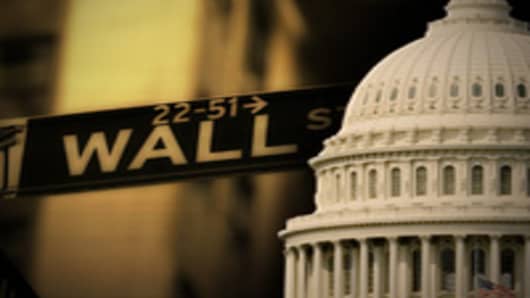The Senate Thursday is expected to vote in favor of ending debate on a sweeping packaging of financial reforms, setting up a final vote on whether to approve the legislation in the days ahead.
Sources say that this time the Democrats will muster the 60 votes needed to avoid a possible Republican filibuster, after falling three votes short Wednesday.
One Senate source said "we do expect to have the 60," but wasn't sure who would help Democrats reach that threshold.
The vote, which is technically a reconsideration of yesterday's vote, is scheduled for 2:30 p.m. ET Thursday.
The "no" vote Wednesday came amid simmering differences over a number of measures, which have yet to be resolved.
Democrats control 58 seats and can usually count on the support of independent Bernie Sanders of Vermont. That means they need only one Republican to vote with them.
In this case, sources say three GOP senators will vote for cloture. That group is composed of Maine's senators, Susan Collins and Olympia Snowe, who voted in favor of cloture Wednesday; and the newly-elected Scott Brown of Massachusetts.
Brown was expected to vote with the Democrats yesterday but changed his mind over lingering concerns about how some of the too-big-to-fail provisions might affect big mutual fund firms in his state, such as Fidelity.
Since then, Brown was given "some assurances .... to get him back on board," said one senior Congressional staffer familiar with the conversations, adding that lawmakers did not see the fund firms as presenting a risk to the financial system.
Add to those votes to that of Pennsylvania's Arlen Specter, a Republican turned Democrat, who did not vote yesterday because he had yet to return to Washington following his primary defeat Tuesday; and Majority Leader henry Reid, who changed his vote to no at the last minute Wednesday for procedural reasons, and the Democrats have 60 votes.
Seeing that defeat was unavoidable, Reid changed his vote so he could also file a motion to reconsider the vote, the Senate version of a do-over, which will take place today.
Under such a scenario, Democrats Maria Cantwell of Washington and Russell Feingold of Wisconsin, who broke with their party and voted no Wednesday, would not be needed to vote for cloture.
Cantwell is said to be among the many members frustrated by the fact that only a small percentage of the 300 amendments filed have been debated and voted on. She has offered two amendments, but neither of which had been taken up.
Sen. Evan Bayh (D-Ind.) confirmed to CNBC Thursday that the fast-track approach was creating unnecessary friction.
"I wanted to offer some amendments. Republicans wanted to. We're not getting a chance to vote on these issues," said Bayh. "We had no debate, no chance to work through these issues."
Procedure aside, two contentious issues remain on the table--derivatives regulation and the powers of a new consumer protection agency.
One key, and fairly unpopular measure, crafted by Banking Committee Chairman Chris Dodd (D-Conn.) and Sen. Blanche Lincoln (D-Ark.), chair of the Agriculture Committee—would force banks to create special subsidiaries for their swaps operations.
There's been some effort to revise and water that down. A new compromise proposal spearheaded by Dodd would call for a two-year study to see if the restriction—which is not in the House version of the bill—is merited.
That change won't be enough, according to the Congressional source, who predicts the Dodd-Lincoln measure will not make it into the final Senate-House compromise version of the bill.
"The thing to do is to modify the provision so banks can still hedge their own financial risk," said the source.
House Financial Services Chairman Barney Frank said as much to CNBC. "I suspect...banks should be allowed to hedge their own financial risk," said Frank, who added his own efforts to write tough derivatives legislation were defeated in the House.
Another key component—creating an over-the-counter trading and settlement system—has fairly wide support, but some would like a strong end-user exemption for companies that use derivatives as an operational hedge.
Consuming Subject
The other big battleground is the creation of a powerfulregulator to protect consumers from potential abuse by financial services companies, especially in the area of mortgages.
As proposed by Dodd, the Consumer Financial Protection Bureau would be an independent agency housed at the Federal Reserve with a presidentially appointed director, rule-making, examination and enforcement powers.
One amendment, sponsored by Sam Brownback (R-Kansas), would exempt auto companies, an idea Dodd himself fiercely opposes.
Senate Democrats have been trying to push through The Wall Street Reform Act for almost a month, despite a number of procedural obstacles possible only in the Senate, and thus catch up to the efforts of the House, which approved its version of financial reform late last year.
Many of the provisions, from too-big-to-fail authority to new capital requirements, are meant to avoid the possible collapse and government bailout of big firms, as was the case with AIG , Citigroup and Bank of America in 2008.
Some restrictions would also affect the two big remaining Wall Street firms, Goldman Sachs and Morgan Stanley .
The president has made financial reform his top priority and said he wants to sign a bill into law by Memorial Day weekend. That is now very unlikely because once the Senate passes its version, a compromise version will have to be cobbled together with the House and then approved by both chambers.
Rep. Frank told CNBC that a bill would be ready for the President to sign "well before the Fourth of July."



